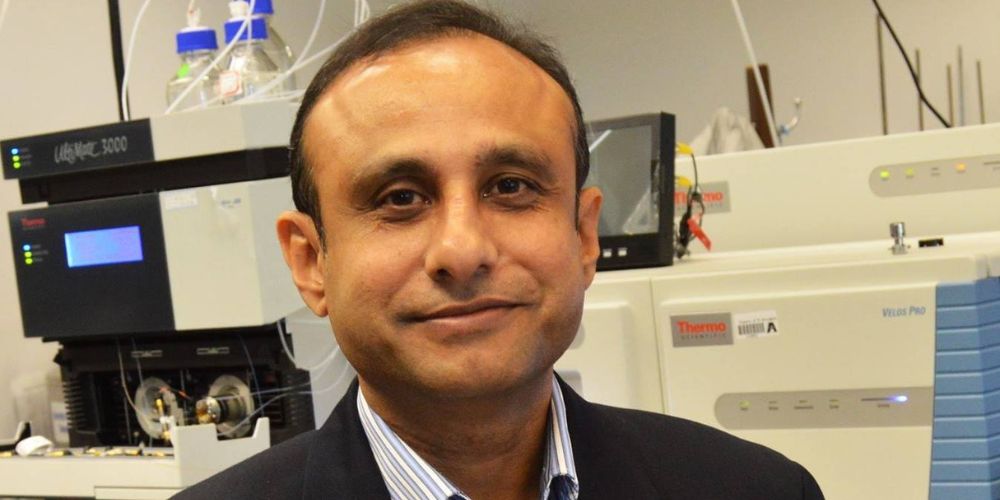Protein Chemist Lands NIH Grant to Study Inflammation
Wednesday, Sep 17, 2025 • Drew Davison : Contact

The University of Texas at Arlington has received a $1.84 million federal grant to study how the body’s natural defense system can sometimes go wrong—and how that knowledge could lead to better treatments for disease.
The five-year project will take place in UT Arlington’s Proteomics Lab, led by Saiful Chowdhury, associate professor of chemistry and biochemistry. His team is internationally recognized for developing new ways to investigate how proteins drive harmful inflammation, a process linked to cancer and other inflammatory-related diseases.
“The ultimate goal is to create a blueprint of how these immune proteins work,” Dr. Chowdhury said. “These insights could lead to new medical treatments for cancer and a wide range of inflammatory diseases.”
Related: Biologist Leads New $1.8 Million Gene Regulation Study
The grant comes from the National Institute of General Medical Sciences, part of the National Institutes of Health.
To conduct the study, Chowdhury’s team will use advanced proteomics technologies—tools designed to study proteins and their interactions and modifications. One of their innovative methods is known as dual cleavable crosslinking. In simple terms, it works by linking together proteins with chemical “connectors.”
When those “connectors” are later split apart inside a mass spectrometer—a device that breaks molecules into pieces and weighs them—the result is like a molecular fingerprint. This allows scientists to map how proteins connect and communicate inside the immune system.
By stabilizing weak, transient and strong interactions inside cells, the team can identify a more complete picture of how the immune activity is regulated. Chowdhury’s group has already published findings in leading journals such as the Journal of the American Society of Mass Spectrometry and Molecular Omics, demonstrating the power of their technology.
“By combining innovative chemistry, advanced mass spectrometry and new bioinformatics tools, we can uncover the hidden molecular interactions and modifications that drive immune defense—and, in some cases, harmful inflammation,” Chowdhury said. “This knowledge could help us design smarter drugs that reduce harmful inflammation without weakening the body’s defenses against infection.”
About The University of Texas at Arlington (UTA)
Celebrating its 130th anniversary in 2025, The University of Texas at Arlington is a growing public research university in the heart of the thriving Dallas-Fort Worth metroplex. With a student body of over 42,700, UTA is the second-largest institution in the University of Texas System, offering more than 180 undergraduate and graduate degree programs. Recognized as a Carnegie R-1 university, UTA stands among the nation’s top 5% of institutions for research activity. UTA and its 280,000 alumni generate an annual economic impact of $28.8 billion for the state. The University has received the Innovation and Economic Prosperity designation from the Association of Public and Land Grant Universities and has earned recognition for its focus on student access and success, considered key drivers to economic growth and social progress for North Texas and beyond.
Latest News
- Experts explore AI’s future in health care at UTAFifth annual Texas Health Informatics Alliance Conference spotlights ethical, responsible AI
- Students turn research into award-winning venturesTop prizes at MavPitch go to projects on advanced wound care and sustainable carbon tech
- Curtains rise on UTA’s daring theater seasonStudents take the lead in a season of ambitious productions, from a Shakespeare-inspired drama to Tony-winning musicals
- The Long History of The ShorthornUTA’s student newspaper is almost as old as the University itself. Yet its student-journalists remain driven by the same desire as those who published the very first issue: to tell the important stories of the campus and its community.
- Who let the dogs talk?UTA computer scientist Kenny Zhu shares encouraging early results of research into canine vocalizations
- New flood maps, data aim to protect Texas communitiesUTA researcher leads study showing how tracking floodplain changes can guide recovery and build resilience






